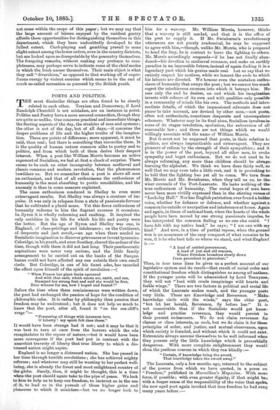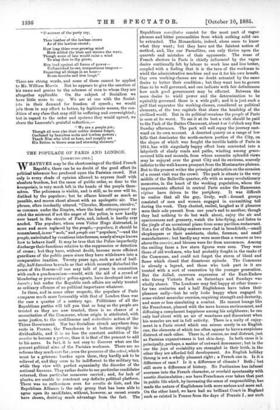POETS AND POLITICS.
Itlimost disaimilar, to things are often found be closely elated to each other. Toryism and Democracy, if Lord Randolph Churchill is not mistaken, are an instance in point. Polities and Poetry have amore assured connection, though they are quite as unlike. One concerns practical andimmediate things, the fleeting aspects of the day, the rivalries of men and systems; the other is not of the day, but of all days,—it concerns the deeper problems of life and the higher troths of the imagina- tion. These are points of difference; more apparent, it must be said, than real ; but there is something that reconciles them. It is the quality of human nature common alike to poetry and to polities, and from which both of them derive their deepest interest. When a poet like William Morris becomes an active exponent of Socialism, we feel at first a shock of surprise. There seems to be such an utter incongruity between medieaval and classic romance and modern revolution, that the phenomenon bewilders us. But we remember that a poet is above all men an enthusiast, and that of all enthusiasms the enthusiasm of humanity is the most absorbing to poetic sensibilities, and the
anomaly is thus in some measure explained.
The same. enthusiasm conduced in Shelley to even more extravagant results. But Shelley was always a creature of im- pulse. It was only in relapses from a state of passionate fervour that he cultivated a placid muse. Yet this fierce enthusiasm of humanity redeems in him the flagrant excesses it occasions. In Byron it is wholly redeeming and exalting. It inspired the only ambition in his life for which his life and poetry were the better. But the age of Byron. and Shelley was one, in England, of class-privilege and intolerance; on the Continent, of .desperate and just revolt,—an age when there needed no Socialistic imagination to discover grievances or invent tyrannies. Coleridge, in his youth, and even Southey, shared the ardour of the time, though with them it did not last long. Their pantisocratic aspirations were never very serious, and the little family arrangement to be carried out on the banks of the Susque- hanna could not have affected any one outside their own small circle. But Coleridge, in one of his finest odes, has recorded the effect upon himself of the spirit of revolution :H
" When France her giant limbs upreared And with that oath, which smote air, earth, and sea, Stamped her strong foot and said she would be free, Bear witness for me, how I hoped and feared !"
Before the time when these reminiscences were written down, the poet had exchanged the passion of hope for the condition of philosophic calm. It is rather by philosophy than passion that- freedom may be understood ; but it does not help us much to know that the poet, after all, found it "on the sea-cliff's verge "-
"Possessing all things with intensest love,
0 Liberty ! my spirit felt-thee there."
It would' have been strange had' it not ; and it may be that it was best to tarn at once from the horrors which the ode recapitulates to the repose of nature,—but it would have been more courageous if the poet had put in contrast with the anarchist travesty of liberty that' true liberty to which a dis- tressed nation might aspire.
England is no longer a distressed nation. She has passed in her time through terrible revolutions ; she has achieved mighty reforms-; and whatever may still,be wanting to her perfect well- being, she is already the freest and most enlightened country of the globe. Surely, then, it might be thought, this is a time whemthe poet should again take to the pipe of peace. We look to him, to help us to keep-our freedom, to. instruct as in the use of it, to lead us in the pursuit of those higher gains and
pleasures to which it ministers—but we no longer look to him for a war-cry. Mr. William Morris,. however, thinks that a war-cry is still needed, and that it is the office of the poet to supply it. If Mr: Stvinberne's revolutionary utterances are not purely academical, he- may be supposed to agree with him,—though, unlike Mr. Morris; who is prepared to head the fray, he is content to leave the fighting to others. Mr. Morris accordingly suspends-.if he ham: not finally aban- doned—his devotion to media3val romance, and seeks an earthly paradise in an impossible future; instead of again finding it in a legendary past which his genius made real. Let us say that we entirely respect his motives, while we lament the ends to which his labours are directed. We honour even the mistaken enthu, siasm of humanity that sways the poet; but we cannot too-much regret the mischievous excesses into whioh it betrays him: Hey sees only the end he desires, an end which his imagination invests with colours of its own and with qualities only possible in a community of minds like his own. The methods and inters
mediate details, of which the impassioned advocate doss, not pause to take account, are, devised by other men,—not pee* often not enthusiasts, sometimes desperate and unscrupulous, schemers. Whatever may be its final aims, Socialism involvesin, some of its stages revolution, spoliation, the subversion of all reasonable law ; and these are not things which we would willingly associate with the name of William Morris.
But it must not be supposed that poets,in their relation to politics, are always impracticable and extravagant. They are pioneers of reform by the strength of their sympathies ; and it is in the power of the poet, beyond all other men, to evoke sympathy and beget enthusiasm. But we do not need to be
always reforming, any more than children should be always, learning the alphabet. We think we have done fairly well, so well that we may even take a little rest, and it is provoking to,
be told that the fighting has yet all to come. We turn from
Mr. MOrris and Mr. Swinbarne, when they tell us so h to the wiser counsels of the Poet-Laureate. He lacks nothing-of; the true enthusiasm of humanity. The social. hopes of men have never been more vividly expressed than in the stirring vereea-ef.
"Locksley Hall." Nor has English patriotism ever found a.bolder voice, whether for defiance or defence, and whether against a
common foe outside or usurpation and intolerance at home. Again and again, in times of national heat, when the hearts of the whole people have been moved by one strong passionate impulse, be has interpreted the common feeling as no one else could. "I
have felt with my native land," he says ; "I am one with my kind." And now, in a time of partial repose, when the ground won is an assurance of the easy conquest of what remains trehe won, it is he who best tells us where we stand, and what England is :—
"A land of settled government,
A land of just and old renown Where Freedom broadens slowly down From precedent to precedent."
Thus, in four terse lines he gives us a perfect account of our legislative system and its result—that result of social order and
constitutional freedom which distinguishes ne among all nations. If the younger poets will be admonished by Lord Tennyson,. they will not "feed, with crude- imaginings wild hearts .and feeble wings." There are two factors in political and social life of which the Laureate makes much, and the younger poets
very little. These are Knowledge and Reverence. "Make. knowledge circle with the winds," says the elder. poet, "but let her herald, Reverence, fly before her." It is not conceivable that if the Socialists would get know- ledge and practise reverence, they would persist in
their present endeavours. We do not claim reverence for. classes or class interests, as such, but we do claim it for those principles of order, and justice, and mutual observance, upon which society is founded, and without which it could not exist. Extremists always assume themselves .to be well informed when they possess only the little: knowledge which is proverbially dangerous. With more complete enlightenment they would shnn the perilous courses in. which they run blindly :—
" Certain, if knowledge bring the sword, That knowledge takes the sword away."
The Laureate, only a few months ago, returned to the 'subject of the poems from, which we have quoted, in a poem on "Freedom," published in 3faentillan'e Magazine. With more force, if possible ; with.even greater dignity, if that might be, with ,a deeper sense of the responsibility of the voice that, spoke,
the now aged poet again invoked, that true freedom he had sung many years before :—
"0 scorner of the party cry, Thou loather of the lawless crown As of the lawless crowd; How long thine ever-growing mind Hath stilled the blast and strewn the wave, Though some of late would raise a wind To sing thee to thy grave,
Men loud against all forms of power— Unfurnished brows, tempestuous tongues— Expecting all things in an hoar—
Brass mouths and iron lungs."
These are strong words, and some of them cannot be applied to Mr. William Morrie. But he appears to give the sanction of his name and genius to the schemes of men to whom they are altogether applicable. On the subject of Socialism we have little more to say. We are at one with the Social- ists in their demand for freedom of speech ; we would join them in any effort to better, by legitimate means, the con- dition of any class that may still be suffering and overweighted ; but in regard to the order and systems they would uproot, we share the Laureate's grateful reflection,—
" We are a people yet ; Though all men else their nobler dreams forget, Confused by brainless mobs and lawless powers ; Thank Him who isled us here, and roughly set His Briton in blown seas and storming showers."



































 Previous page
Previous page